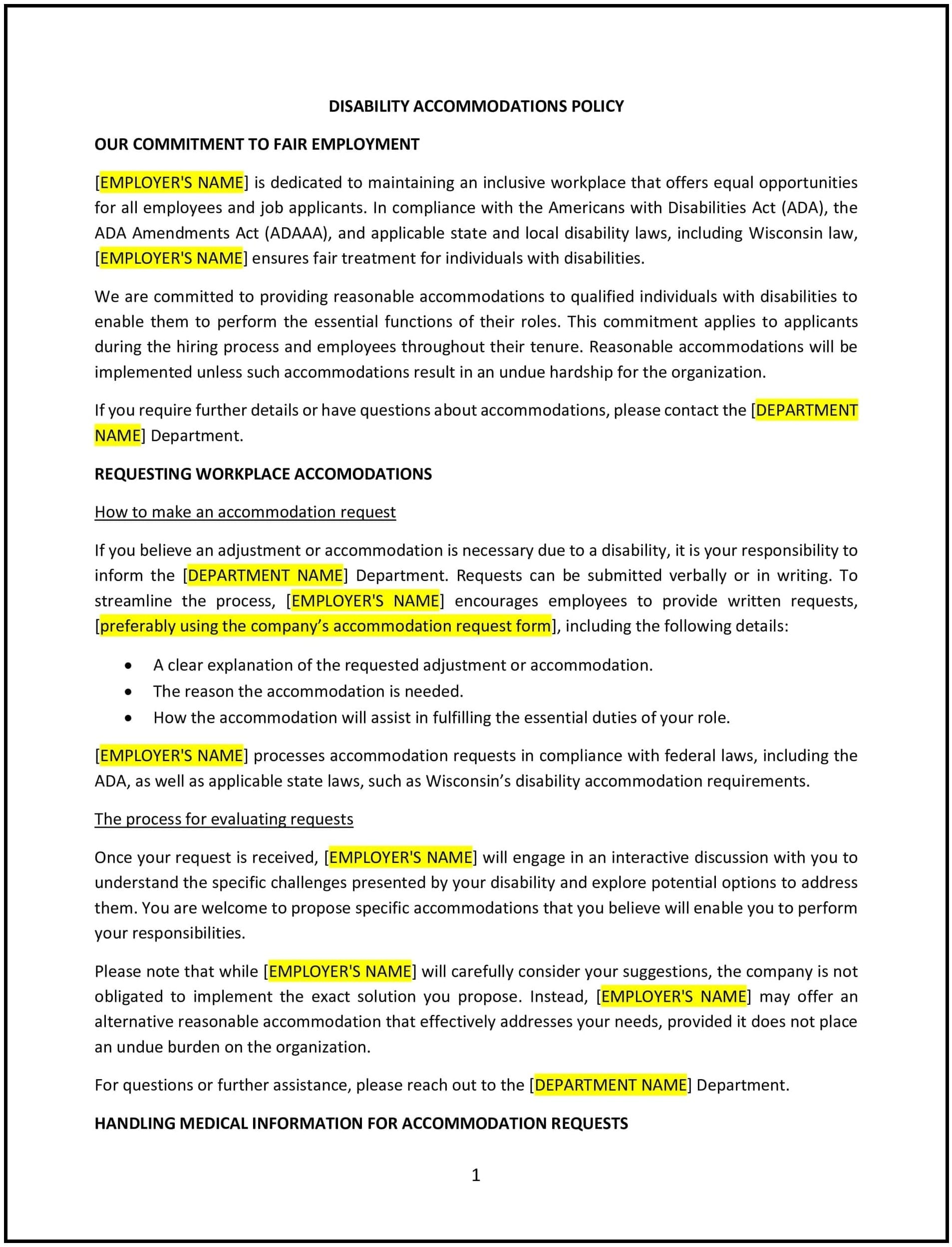Disability accommodations policy (Wisconsin): Free template
Got contracts to review? While you're here for policies, let Cobrief make contract review effortless—start your free review now.

Customize this template for free
Disability accomnodations policy (Wisconsin)
A disability accommodations policy helps Wisconsin businesses provide a clear and structured process for employees with disabilities to request reasonable accommodations that enable them to perform their job duties. This policy outlines the company’s commitment to supporting employees with disabilities, complying with federal and state laws, and fostering an inclusive and accessible workplace.
By implementing this policy, businesses can improve compliance with the Americans with Disabilities Act (ADA) and Wisconsin state disability laws while promoting a fair, respectful, and accommodating environment for all employees.
How to use this disability accommodations policy (Wisconsin)
- Define disability and reasonable accommodation: Specify what constitutes a disability under the ADA and Wisconsin law, and outline what is meant by a reasonable accommodation. This may include modifications to the physical workspace, flexible work hours, or the provision of assistive technology.
- Set a clear request process: Establish a straightforward process for employees to request accommodations, including whom to contact, how to submit the request, and any required documentation (e.g., medical records or professional recommendations).
- Review each request individually: Ensure that each accommodation request is considered on a case-by-case basis, taking into account the employee’s specific needs, job requirements, and available resources.
- Engage in the interactive process: Encourage open communication between the employee and management to discuss the accommodation request, assess potential solutions, and address any concerns.
- Evaluate the reasonableness of accommodations: Define what constitutes a reasonable accommodation and ensure that the requested accommodation does not impose undue hardship on the company, such as significant cost or disruption to business operations.
- Maintain confidentiality: Ensure that all information related to disability accommodations is kept confidential and shared only with those who need to know, in accordance with privacy laws and company policy.
- Address timeframes: Establish reasonable timeframes for processing accommodation requests, ensuring that the employee’s needs are met in a timely manner without unnecessary delays.
- Document decisions: Keep clear records of accommodation requests, decisions, and any actions taken, including the final accommodation provided or a reason for denial, to support compliance and transparency.
Benefits of using this disability accommodations policy (Wisconsin)
This policy offers several benefits for Wisconsin businesses:
- Ensures legal compliance: The policy improves the company’s compliance position with the ADA, Wisconsin disability laws, and other relevant regulations, reducing the risk of legal challenges or claims of discrimination.
- Promotes inclusivity: The policy fosters an inclusive workplace by providing employees with disabilities the support they need to succeed and participate fully in the workplace.
- Enhances employee retention: By offering accommodations, businesses can retain valuable employees who might otherwise be unable to perform their jobs due to a disability, reducing turnover and recruitment costs.
- Improves employee morale: Providing accommodations shows employees that the company values diversity and is committed to creating a fair and supportive work environment.
- Reduces workplace barriers: The policy helps identify and eliminate physical or operational barriers that may prevent employees from performing their job duties, leading to greater productivity and job satisfaction.
Tips for using this disability accommodations policy (Wisconsin)
- Communicate the policy clearly: Ensure that all employees are aware of the policy and understand their rights to request accommodations. This can be done during onboarding or through periodic training sessions.
- Be proactive: Consider accommodations that may be needed before they are formally requested, especially for employees with known disabilities, to create a more accessible and welcoming environment.
- Foster an open dialogue: Encourage employees to discuss their needs and concerns regarding accommodations without fear of stigma or discrimination.
- Involve relevant parties: When appropriate, involve healthcare providers or other professionals to help identify the most effective accommodations for the employee.
- Review the policy regularly: Periodically review the policy to ensure it maintains compliance with changing state and federal laws, as well as to ensure it continues to meet the evolving needs of employees with disabilities.